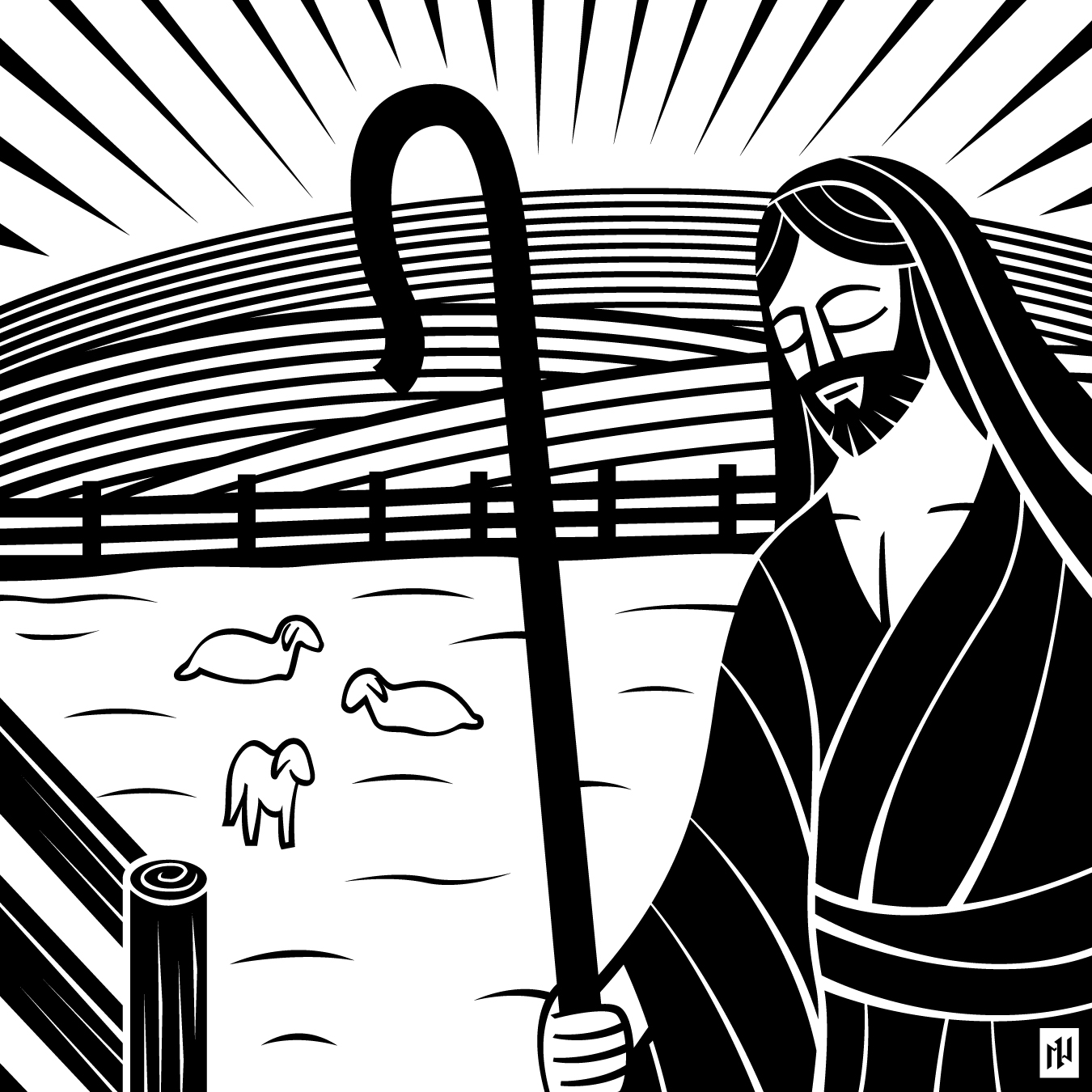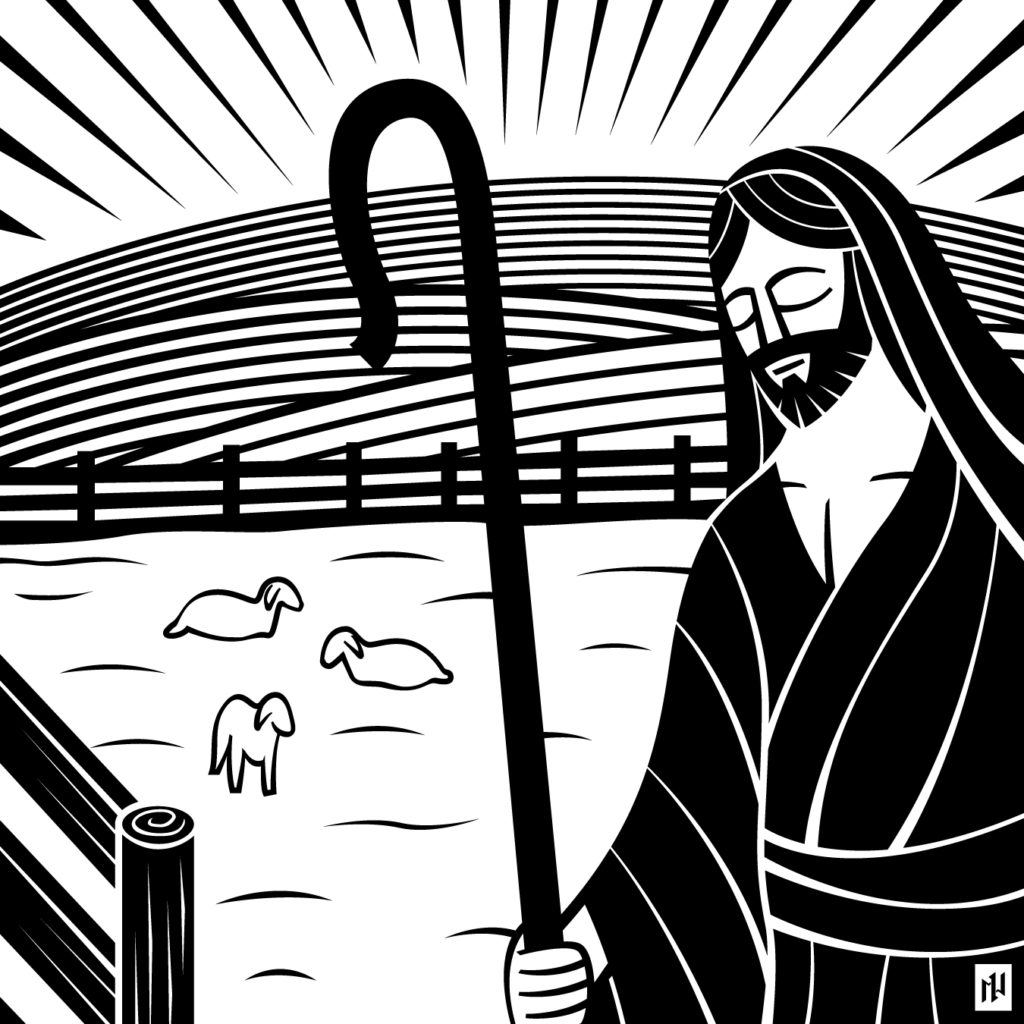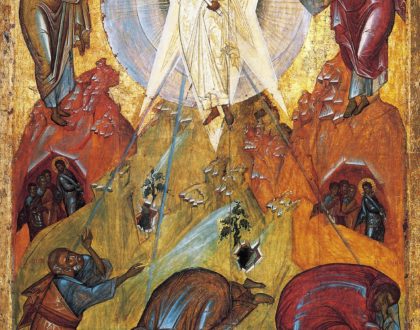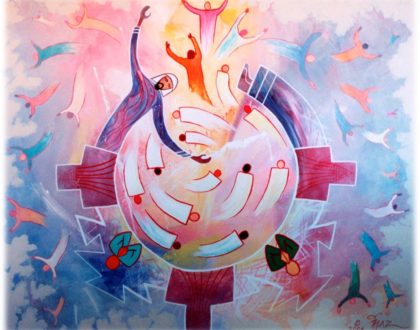June 3 // Psalm 49

by Julie Hordyk
His Blood is Our Ransom
Opening Prayer:
Holy, holy, holy, is the Lord God Almighty,
who was and is and is to come. – Revelation 4:8
Psalm 49
The Folly of Trust in Riches
To the leader. Of the Korahites. A Psalm.
1 Hear this, all you peoples;
give ear, all inhabitants of the world,
2 both low and high,
rich and poor together.
3 My mouth shall speak wisdom;
the meditation of my heart shall be understanding.
4 I will incline my ear to a proverb;
I will solve my riddle to the music of the harp.
5 Why should I fear in times of trouble,
when the iniquity of my persecutors surrounds me,
6 those who trust in their wealth
and boast of the abundance of their riches?
7 Truly, no ransom avails for one’s life,
there is no price one can give to God for it.
8 For the ransom of life is costly,
and can never suffice,
9 that one should live on forever
and never see the grave.
10 When we look at the wise, they die;
fool and dolt perish together
and leave their wealth to others.
11 Their graves are their homes forever,
their dwelling places to all generations,
though they named lands their own.
12 Mortals cannot abide in their pomp;
they are like the animals that perish.
13 Such is the fate of the foolhardy,
the end of those who are pleased with their lot.Selah
14 Like sheep they are appointed for Sheol;
Death shall be their shepherd;
straight to the grave they descend,
and their form shall waste away;
Sheol shall be their home.
15 But God will ransom my soul from the power of Sheol,
for he will receive me.Selah
16 Do not be afraid when some become rich,
when the wealth of their houses increases.
17 For when they die they will carry nothing away;
their wealth will not go down after them.
18 Though in their lifetime they count themselves happy
—for you are praised when you do well for yourself—
19 they will go to the company of their ancestors,
who will never again see the light.
20 Mortals cannot abide in their pomp;
they are like the animals that perish.

His Blood Is Our Ransom
I did not set out to write about another atonement theory this week. We have the Daily Office to thank for that. Two weeks ago the Wednesday morning prayer was Psalm 68, which led me to praise Christ the Victor for destroying the power of Sin and Death for all creation. Remember how the ascended King “rides on the clouds”. Today, Psalm 49 invites us to praise the One who ransomed us from the clutches of death.
Not every Old Testament passage is so easy to link to Jesus Christ. Think of the snake pits in the desert, the exiles to Assyria and Babylon, or the strange words of Haggai and Jeremiah. Sometimes it takes a little work to understand what a particular passage of scripture has to teach us. And then there are verses like this:
Truly, no ransom avails for one’s life,
Psalm 49:7-9 NRSV
there is no price one can give to God for it.
For the ransom of life is costly,
and can never suffice,
that one should live on forever
and never see the grave.
Or, if you like, here is Eugene Peterson’s translation:
Really! There’s no such thing as self-rescue,
Psalm 49:7-9 The Message
pulling yourself up by your bootstraps.
The cost of rescue is beyond our means,
and even then it doesn’t guarantee
Life forever, or insurance
against the Black Hole.
We were all destined for the grave. Our bodies are mortal, stepping toward death every moment we’re alive. I don’t mean to be grim; just realistic, like this passage is.
The author meditates on the accumulation of wealth he sees around him. A few have begun to possess a lot, and as they’ve done that, they’ve put their trust in it more and more. The psalmist watches as simple possession turns into idolatry: the Lord is no longer the one they look to keep them fed, or housed, or content. He then targets wisdom, another so-called higher pursuit that will serve us for a moment, but not forever. The psalmist strongly resembles the Teacher of Ecclesiastes in this moment, stating flatly and unemotionally that everything will die one day. “But,” he says, “God will ransom my soul from the power of Sheol.”
You’ve heard it already, but it bears repeating: the money is not the problem. Misplaced, idolatrous love is the problem. Our fickle hearts can grab onto anything. The psalmist brings the love of wealth into focus here because money is used as a means of exchange. The aphorism, “There are some things money can’t buy,” may have started here, or it may have already existed. Anyway, he goes beyond that aphorism to name the most important thing our money cannot buy: a pass from death. The voracious appetites of the rich and the wise indicate to the psalmist that perhaps they have forgotten what these gifts are for.
In the Sinai desert, God gave the Israelites enough manna for the day. The morning before the Sabbath, he gave them enough for two. God provided no more than, and no less than, enough for everyone.The blood of Christ works in the same way. His blood has paid the ransom that was due for everyone. While we were sinners, the Evil One held us in his clutches, knowing that we were destined for the grave. Jesus’ blood was the price that was demanded, and his blood will always be sufficient to that purpose. We only need the gift of faith to access it — and even that is given by the Spirit of God. (For further reading, check out the Belgic Confession.)
In this sense, no one of us is privileged against another. Not clergy, not old or young, not black or white: we have all been offered the same gift, and it has all been paid for.
But that doesn’t mean our work is done. At the close of the psalm, the teacherly tone resumes (“Do not be afraid when some become rich…”), indicating that this psalm is one of instruction. Psalm 37 and 119 stand out in this regard as well, along with the whole book of Proverbs. An older, more experienced voice explains some of the ways of the world to a pupil, preparing them for the hazy cultural onslaught they are about to encounter. It’s important for young people to know that wealth and wisdom are temporary, and that both are useless if they’re not used to serve the greater Kingdom of God. Teaching children early on about the sacrificial love of Jesus Christ prepares them to offer that same love to others. We all need to be shown which shepherd to follow — of all the presented options, there is only one whose path continues beyond the grave. It’s important that we don’t forget these lessons either.
At the end of the day, this psalm is about more than just shunning greed and idolatry. It’s not finally about cheating death or shunning fools. It’s about the unconditional love of a God who gave his own life as a ransom for the Sin of the world.
So, after all that, what is true wisdom? To lay down our lives for others, like Jesus did.
Closing Prayer:
Almighty and everlasting God,
you have given to us your servants grace, by the confession of a true faith, to acknowledge the glory of the eternal Trinity, and in the power of your divine Majesty to worship the Unity:
Keep us steadfast in this faith and worship, and bring us at last to see you in your one and eternal glory, O Father; who with the Son and the Holy Spirit live and reign, one God, for ever and ever. Amen.
Recommended Posts

“The Prayers of the Saints” Sermon Series
September 17, 2020

The Lord’s Prayer Curriculum | Personal or Small Group Study
September 17, 2020
July 15 // Psalm 139
July 16, 2020
